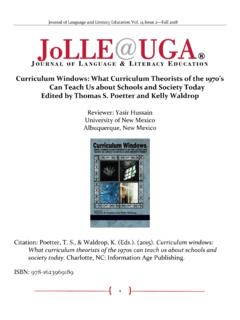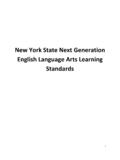Transcription of Nursery Rhyme Knowledge and Phonological Awareness in ...
1 THE JOURNAL OF LANGUAGE AND LITERACY EDUCATION 65 Citation Harper, L. J. (2011). Nursery Rhyme Knowledge and Phonological Awareness in preschool children . The Journal of Language and Literacy Education [Online], 7(1), 65-78. Nursery Rhyme Knowledge and Phonological Awareness in Preschool children Laurie J. Harper University of Rhode Island Phonological Awareness is an important precursor in learning to read. This Awareness of phonemes fosters a child s ability to hear and blend sounds, encode and decode words, and to spell phonetically.
2 This quantitative study assessed pre-K children s existing Euro-American Nursery Rhyme Knowledge and Phonological Awareness literacy, provided Phonological Awareness training with an experimental group of children and investigated the effects of explicit Nursery Rhyme instruction on participants phonemic skill levels. These data reveal that children exposed to the intervention consisting of explicit Euro-American Nursery Rhyme instruction significantly outperformed the children in the control group on Rhyme Awareness and completion statement measures.
3 Results of this research suggest that Knowledge of Nursery rhymes enhances children s Phonological Awareness and sensitivity to individual phonemes and Rhyme , and stimulates phonemic skill development. Keywords: Phonological Awareness , pre-k, kindergarten, and emergent literacy THE JOURNAL OF LANGUAGE AND LITERACY EDUCATION 66 Introduction A growing body of research affirms the link between children s early language skills and later reading abilities (Bryant, Maclean, & Bradley, 1990; Bryant, Maclean, Bradley, & Crossland, 1990; Strickland & Shanahan, 2004; Yopp & Yopp, 2000).
4 The critical role of Phonological Awareness in the development of learning to read has long been established as a precursor to the acquisition of the alphabetic principle the understanding that the letters of the alphabet represent phonemes in speech (Dickinson & Tabors, 2001). This Awareness and understanding of phonemes fosters a child s ability to hear sounds, blend sounds, encode and decode words, and to spell phonetically. One important aspect of literacy preparation is teaching children Phonological Awareness . children entering kindergarten are expected to have an understanding of the sound-based system of our language, including rhyming skills and beginning letter sounds (Lonigan, Burgess, & Anthony, 2000; Snow, Burns, & Griffin, 1998).
5 Many educators believe that before children begin reading instruction, they need to become explicitly aware that spoken words are composed of sounds; children therefore must develop the ability to consciously and analytically hear, identify, and manipulate those sounds (IRA & NAEYC, 1998; National Reading Panel, 1990; Sadlier-Oxford, 2000; Yop & Yop, 2002). Research reveals that there is a link between Nursery Rhyme Knowledge of preschool children and their future success in reading, writing, and spelling. Bradley and Bryant (1983, 1985) report that sensitivity to Rhyme and alliteration prior to a child s entry to formal schooling plays a causal role in their reading success several years later.
6 Furthermore, in their research the authors reported that receiving explicit instruction and training in the areas of alphabetic principles, rhyming, identification of words and alliteration strongly and positively affected children s reading ability. In a subsequent longitudinal study (MacLean et. al. 1987), authors provided systematic evidence that Knowledge of Nursery rhymes played a role in children s Phonological development. Covering a 15-month period, beginning when children were age , data was collected to measure children s Knowledge and growth of five common Nursery rhymes.
7 Findings reported that children s initial Nursery Rhyme Knowledge was a powerful predictor of their growing skill in Rhyme and alliteration detection tasks over the next year and a quarter. Bryant and et. al. (1989) reported further longitudinal data from a group of 64 children ranging from ages to 6, covering a three year period supporting the hypotheses that acquaintance with Nursery rhymes positively affects children s reading ability. Data report a strong relation between early Knowledge of Nursery rhymes and success in reading and spelling, despite differences in social background, intelligence quotient, and beginning Phonological skills.
8 Torgesen (2002) reviewed research-based practices in early reading instruction and found that Phonological Awareness is a valid predictor for the identification of children at risk for reading problems. In a recent study, Vloedgraven and Verhoeven (2007) found that rhyming performance; and the skills of phoneme identification, blending and segmentation are vital aspects of Phonological Awareness . These authors also revealed that the most informative, yet most difficult and discriminating task of children s Phonological Awareness ability is phoneme segmentation, while rhyming performance appears to be the easiest.
9 Additional research which investigates the relationship between a child s Nursery Rhyme Knowledge and their levels of Phonological Awareness skills is needed. This paper reports an investigation of the relationship between Knowledge of Nursery rhymes and phonemic skill development in 20 three-year old pre- K children . T he effect of explicit Nursery Rhyme THE JOURNAL OF LANGUAGE AND LITERACY EDUCATION 67 instruction on children s Phonological Awareness and phonemic skill development in Nursery Rhyme recall, Rhyme identification, and beginning sound Awareness was assessed.
10 Purpose of Study This quantitative study assessed pre-K children s existing Euro-American Nursery Rhyme Knowledge and Phonological Awareness literacy, provided Phonological Awareness training with an experimental group of children and investigated the effects of explicit Nursery Rhyme instruction on participants phonemic skill levels. Two questions were addressed: 1. How much Knowledge of Nursery rhymes do pre-K children have, and 2. Does explicit instruction of Nursery rhymes combined with kinesthetic and hands-on activities increase a preschool child s Phonological Awareness ?



